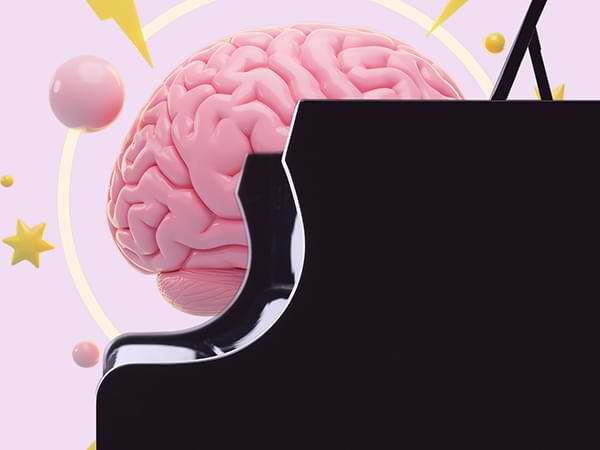Following the start of the 19th International Chopin Piano Competition (Oct. 2–23), how has the city of Warsaw been preparing for this world-renowned event? We spoke online in August with Mariusz Adamczak (47), manager of Kawai Europa GmbH’s Poland Branch, himself a graduate of the piano department at the Academy of Music in Kraków. In addition to describing the atmosphere in the city, he shared how an official piano supplier prepares for the competition.
Interview & text: Rie Hiraiwa (Polish interpreter/translator)
Source: Bravo Magazine (Japanese classical music media outlet)
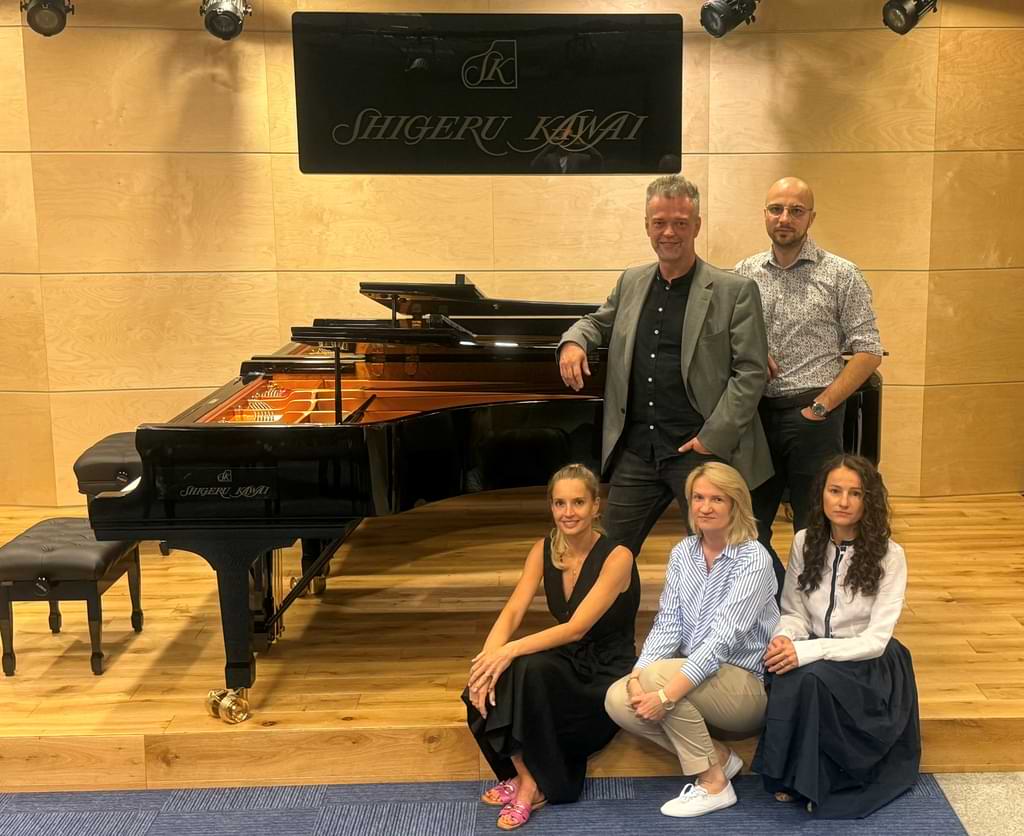
Mariusz Adamczak (back row, left) with members of the Poland Branch staff
Contents
About the preparation for the Chopin Competition
This will be the first Chopin Competition since your Warsaw showroom opened two years ago. Are you undertaking any special preparations as the opening approaches?
Our branch is located about a 15-minute walk from the Philharmonic Hall where the competition is held. During the event, we will provide contestants with rehearsal opportunities in our showroom, which includes a concert hall as well as multiple practice rooms. We are making every effort to respond to the needs of as many participants as possible.
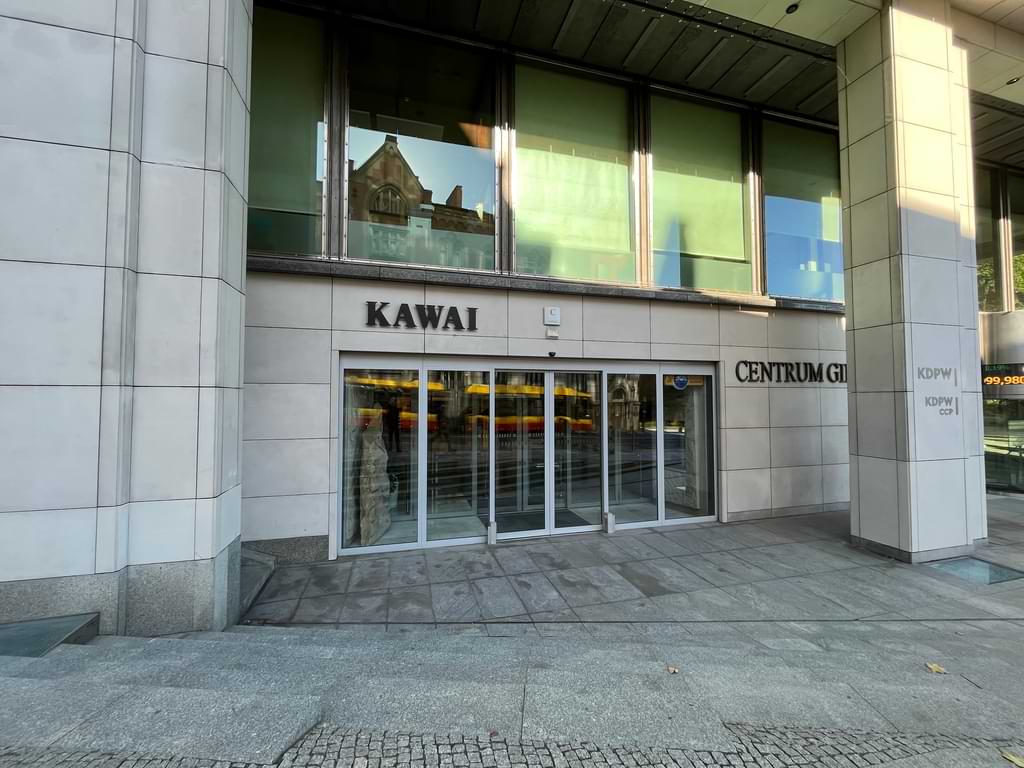
Will contestants be able to practice on the same instruments as those used in the competition?
That depends on the size of the room, but each space is equipped with instruments from the Shigeru Kawai series. Naturally, we will prioritize SK-EX contestants, but if there is availability we would also like other pianists to use them. However, nobody knows which brand they will end up playing until the selection process is complete. Just before the competition begins, contestants are given only 15 minutes on stage to choose their piano from among the instruments lined up. Of course, we hope as many as possible will choose ours!
Note: Five manufacturers are participating in this year’s competition: Steinway, Yamaha, Kawai, Fazioli, and Bechstein. The piano selection process took place Sept. 29–Oct. 1. Kawai is represented by its flagship model, the SK-EX Shigeru Kawai concert grand piano.
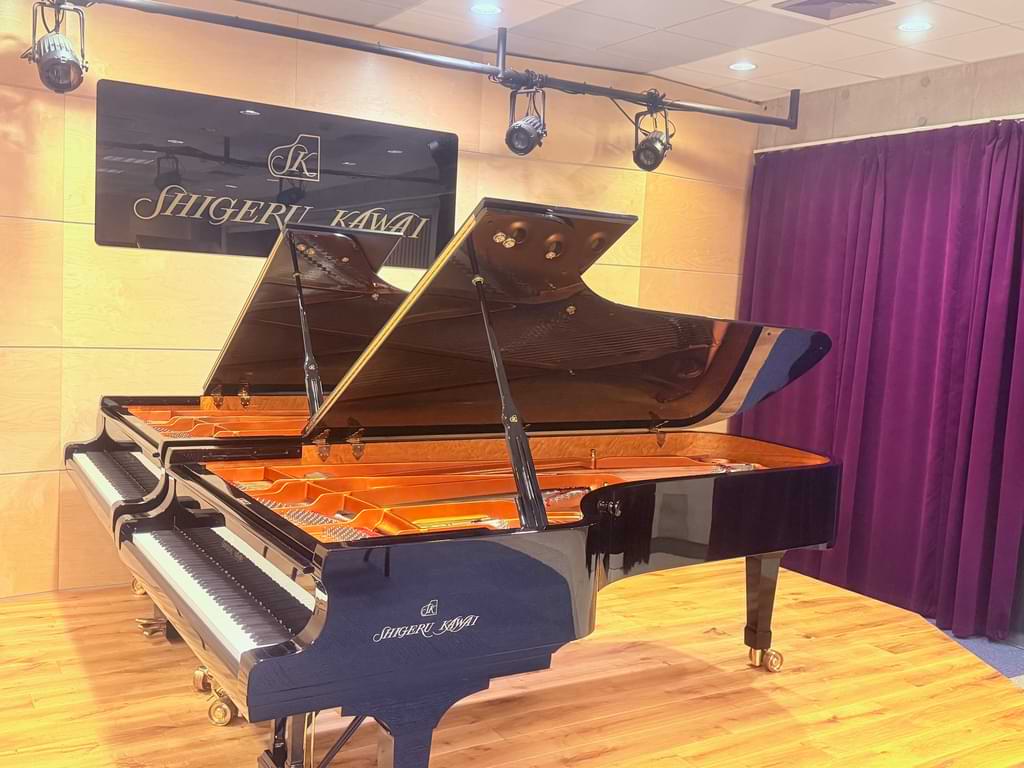
When will the instruments be delivered to the Philharmonic?
All competition pianos are brought in just before the opening at the end of September, in preparation for the selection. Our instruments are already here in Poland. All Shigeru Kawai pianos are handcrafted in Japan, of course. The climate is different here, but within a week of arriving by air they acclimate. As for the competition instruments, we transported several candidate SK-EX models to the Philharmonic in advance, had them tested by various pianists, and – together with our head technician and the Kawai tuning team – selected the one to be used.
In the last competition, many pianists chose the SK-EX, including Alexander Gadjiev, who won second prize.
Yes. Any pianist who plays it will quickly realize that the SK-EX produces exactly the sound they are looking for. Its tone is wonderfully rich, with the potential to “paint pictures in sound” within the space. It allows full freedom of dynamics, and gives the performer complete expressive freedom. The keyboard has superb responsiveness, and above all, the sound is extremely colorful. These are the defining features of the SK-EX, and I believe it is perfectly suited to Chopin’s works.
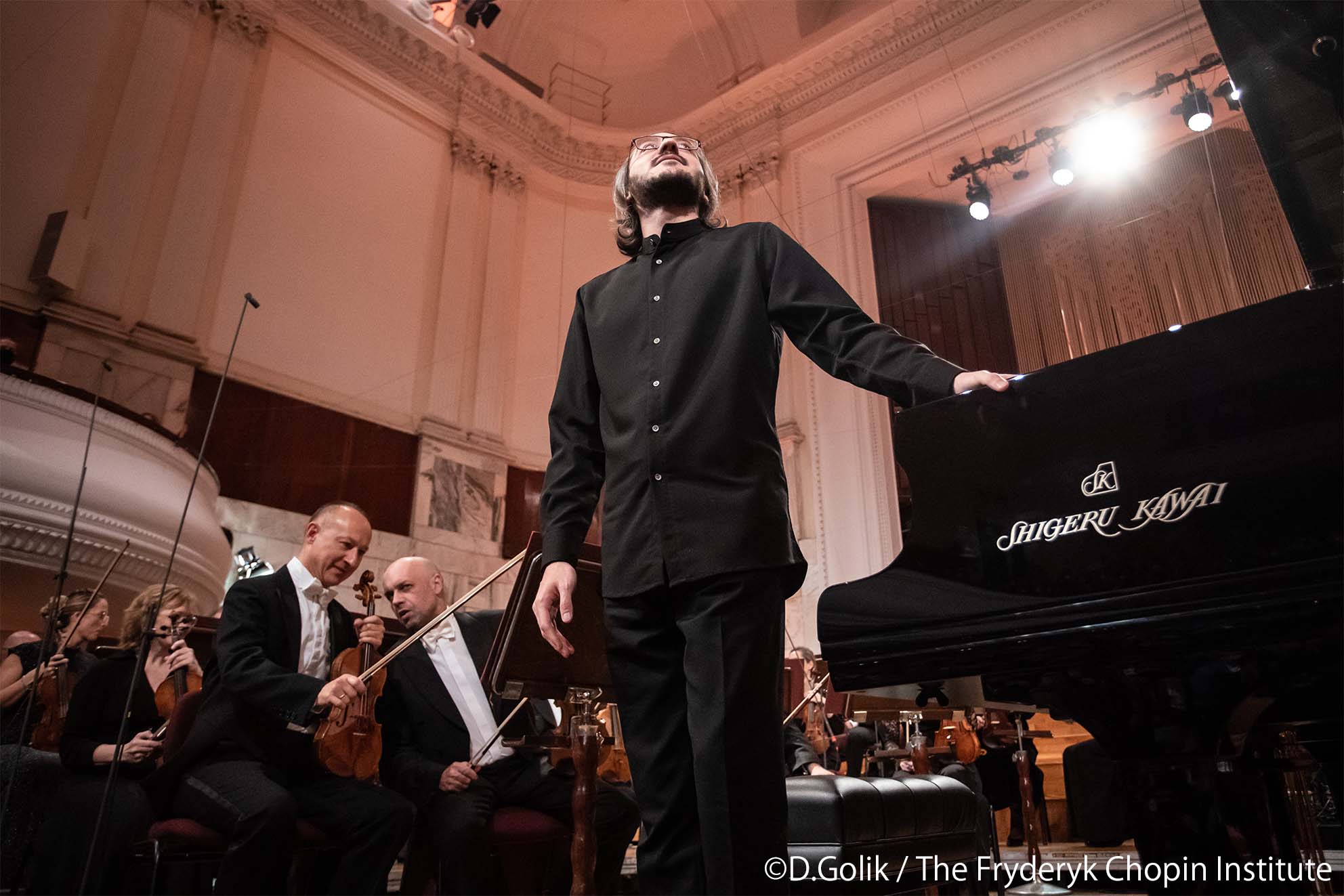
Alexander Gadjiev, 2nd prize in 2021, performing on the Shigeru Kawai SK-EX
That makes us look forward to hearing it all the more. Who usually visits your showroom, where people can try the Shigeru Kawai instruments?
Of course we welcome professional pianists, but many parents who want their children to learn the piano also come. Some customers play for their own enjoyment, while others are hosts who plan private house concerts by inviting young performers and therefore seek the right instrument for such occasions. I feel the number of people who want to own a piano is increasing.
We also have many visitors from music academies – both students and professors. Students practice here regularly, and professors sometimes give lessons or hold classes in our showroom. They also make use of our concert hall. So we enjoy a very good cooperative relationship with the academies. Additionally, there are general pianists who usually practice on an upright at home but occasionally want to play a grand piano, so they come to rent our practice rooms.
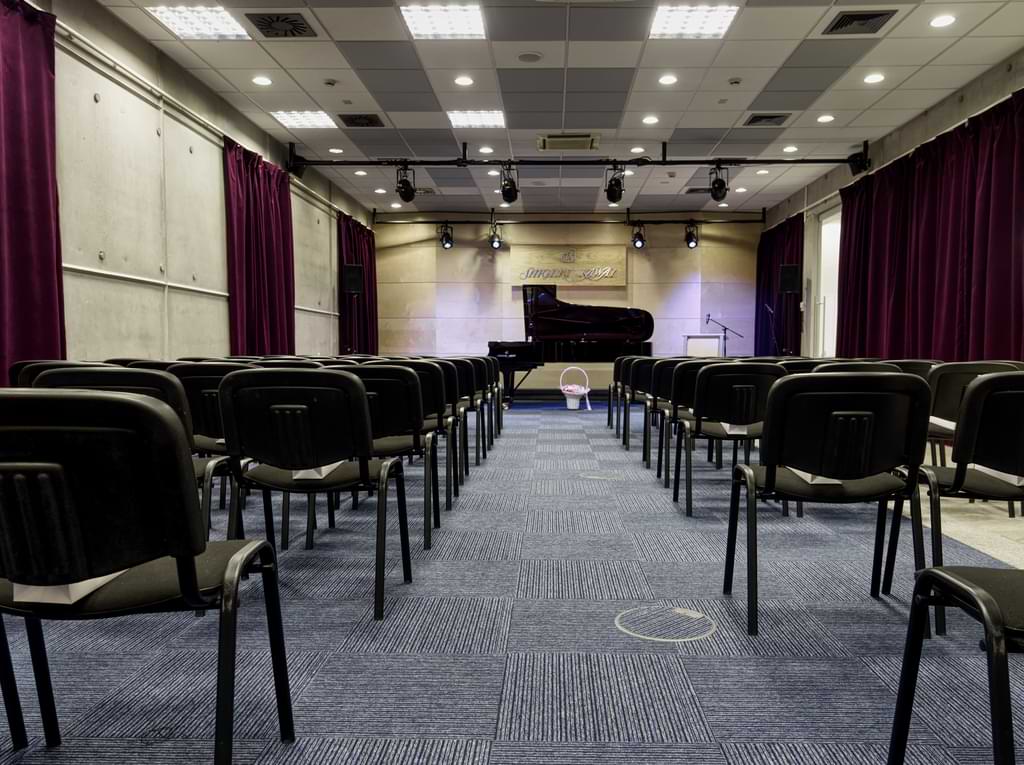
Concert hall attached to the Poland Branch showroom
About the city of Warsaw
With the Chopin University of Music and so many music lovers, Warsaw must be full of music.
Yes. In addition to the Philharmonic, there are many other venues where you can enjoy classical music. Especially in summer, outdoor concerts are held every Sunday at the Chopin monument in Łazienki Park. Each time, some 2,000–3,000 people gather to listen!
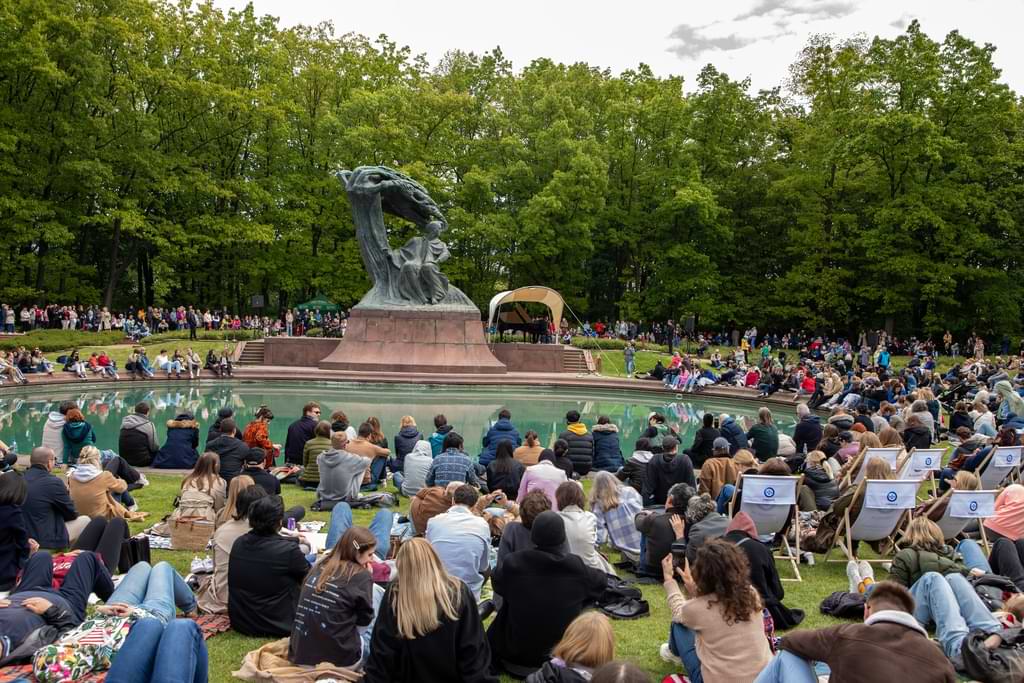
Chopin monument in Łazienki Park, one of Warsaw’s most popular tourist attractions
What is the atmosphere in the city like as the competition approaches?
Recently the Warsaw Doll Museum held a “Chopin Doll Contest,” where people created dolls inspired by Chopin. Events connected with the competition are not limited to music – there are countless activities like this throughout Warsaw and all over Poland, including concerts nationwide. You can really feel the excitement spreading across the country.
Many Japanese people are likely to visit Warsaw to attend the competition. What places would you recommend to those coming for the first time?
For Chopin-related sites, first of all Łazienki Park, as I mentioned, and of course the Chopin Museum is a must. A walk along Nowy Świat Street and Krakowskie Przedmieście Street is also wonderful – these are streets Chopin himself walked, lined with many places connected to him. Most notably, his heart is enshrined in the Church of the Holy Cross. And naturally, visitors shouldn’t miss Warsaw’s Old Town.

Krakowskie Przedmieście Street, one of Warsaw’s main boulevards leading from the Old Town southward
About Mr. Mariusz Adamczak
How did you yourself become interested in the piano?
It started when I was four years old, through my grandmother’s television. She was watching a rebroadcast of the Chopin Competition semifinals, where Ivo Pogorelich was performing. I peeked into her room, listened with fascination, and said: “This is what I want to do!” It so happened that a neighbor had an upright piano, and I would often go there to play. But it wasn’t until later, in secondary music school, that I began to study Chopin’s works in earnest.

Church of the Holy Cross, where Chopin’s heart rests. On October 17, his death anniversary, a memorial mass is held here during the competition.
Poland has a public music education system, doesn’t it?
Yes. I began piano lessons at age seven, attending a state music primary school (equivalent to the elementary stage). Six years later, at 13, I entered the secondary stage, which is another six years. In other words, before entering university, students receive a full 12 years of music education. There are national and public music schools in almost every city in Poland, and many private schools as well.
Note: In music primary schools, regular academic subjects are taught alongside a curriculum that includes music education.
It sounds like a wonderful system. Rafał Blechacz, who won in 2005, is also a product of such schools. Since then there has not been another Polish winner – do people feel “this year it’s our turn”?
Of course. Every time, Polish people hope that a compatriot will win, and it would make everyone very happy. But the winners are chosen by the jury, and the audience’s preferences don’t always align with the judges’ conclusions.
In recent years, there have been many Asian participants. How do you view this trend?
It’s not only in the Chopin Competition – this is a general tendency. But I think it’s a completely natural development. It shows how open Europe has become to Asia, and nowadays you can reach anywhere in the world by plane. Personally, I find it fascinating how pianists from different countries approach the music differently. European countries, China, Japan, Korea – each interprets Chopin in a completely distinct way. One of the joys of the competition is being able to hear this diversity all in one place.
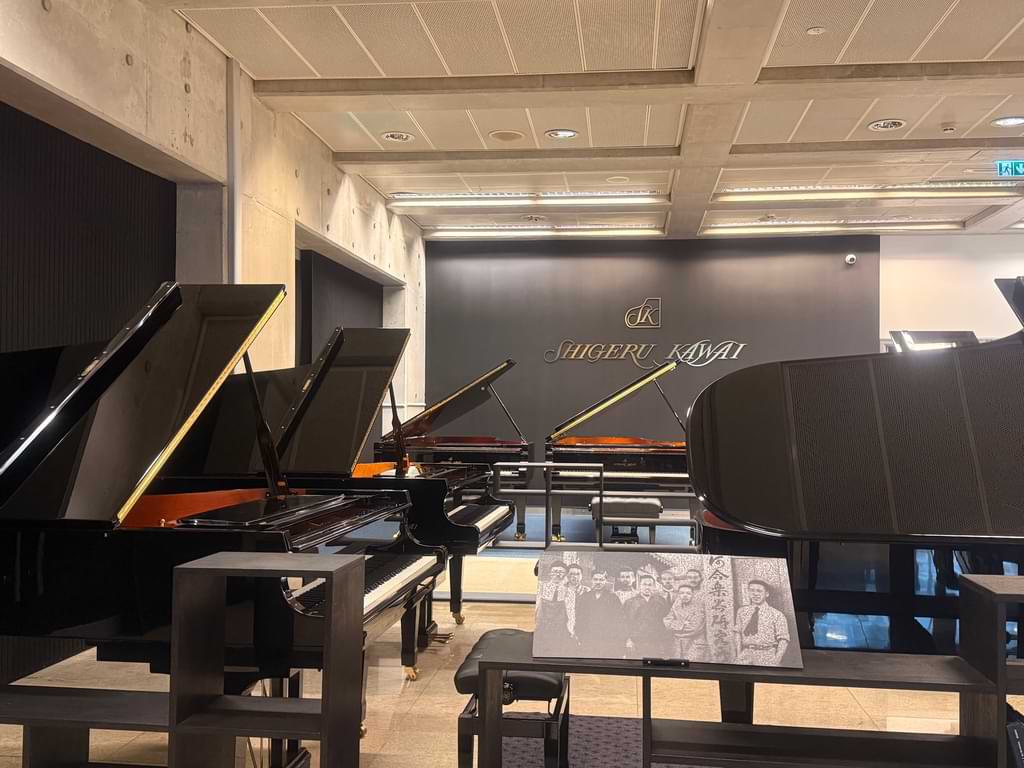
Finally, what do you hope for in this year’s Chopin Competition?
My dream, of course, is for a pianist playing a Shigeru Kawai to win! But above all, I hope that we will discover a pianist with such a rich musical personality that they can truly captivate the audience, bringing a fresh interpretation to Chopin’s music and winning the competition. If such a pianist chooses to play the Shigeru Kawai, then they will be able to draw out the full tonal possibilities of the instrument – and that would indeed be an unbeatable combination.
About the International Fryderyk Chopin Piano Competition
Established and inaugurated in 1927, the International Fryderyk Chopin Piano Competition is one of the oldest music events of its kind in the world. 2025 will see the beginning of a series of special celebrations for its centenary. In the course of the past century, the formal aspects of the competition have constantly evolved, resulting in changing the number of its stages, programme, judging criteria, prizes, and also the media through which audiences have experienced the competition recitals. There have only been two elements of the Competition that have remained unchanged since its inception: Chopin’s music and the fascination of pianists and audiences alike. Another chapter in the hundred-year-long tradition is opening before us. The competition is organised by the Fryderyk Chopin Institute.
Official website: https://www.chopincompetition.pl/en
About the Shigeru Kawai SK-EX full concert grand piano
Unveiled in 2001 as the flagship instrument of the Shigeru Kawai line, the SK-EX concert grand piano is hand-crafted in limited numbers following a unique ‘prototyping’ creation process. In order to achieve the supreme range of expression required in a concert piano, each instrument utilises a variety of carefully selected materials, with premium aged spruce soundboards. Shigeru Kawai instruments adopt the advanced Millennium III keyboard action, featuring extended wooden keys and advanced ABS Carbon action parts, providing superior speed and responsiveness than conventional wooden action parts, allowing pianists to express a greater range of feeling and emotion in their performance.
Official website: https://www.shigerukawai.jp/en/
Photo courtesy & cooperation: Kawai Europa GmbH – Poland Branch

Writer
Rie Hiraiwa
Completed studies in Polish language and culture at the Tokyo University of Foreign Studies, and studied at the Institute of Musicology, University of Warsaw. Her research focuses on Polish dance music and the composer Stanisław Moniuszko.
Her translations include The Chopins’ Warsaw (The Fryderyk Chopin Institute), and she is co-translator of The Complete Letters of Chopin (Iwanami Shoten, three volumes published to date). She is also editor of the Polish vocal anthology Selected Household Songs by Moniuszko (Hanna).
In addition to her work at the Polish Institute in Japan, she is active as a freelance interpreter, translator, and writer.
Completed studies in Polish language and culture at the Tokyo University of Foreign Studies, and studied at the Institute of Musicology, University of Warsaw. Her research focuses on Polish dance music and the composer Stanisław Moniuszko.
Her translations include The Chopins’ Warsaw (The Fryderyk Chopin Institute), and she is co-translator of The Complete Letters of Chopin (Iwanami Shoten, three volumes published to date). She is also editor of the Polish vocal anthology Selected Household Songs by Moniuszko (Hanna).
In addition to her work at the Polish Institute in Japan, she is active as a freelance interpreter, translator, and writer.


